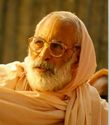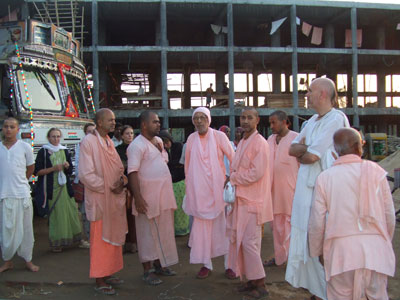
In the late afternoon of November 11th Srila Maharaja visited the building site and was guided around by the brahmacaris in charge of the construction work.

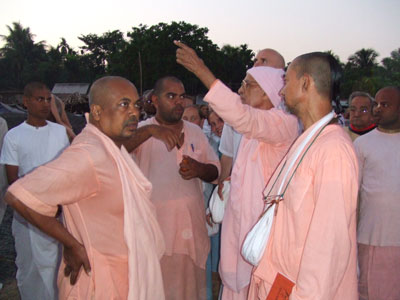
The next morning Srila Maharaja met with the architect.
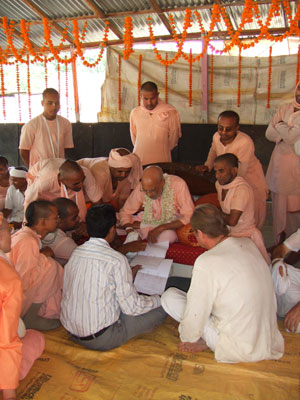
In the late afternoon of November 12th about fifty, mostly local, devotees gathered for Srila Narayana Maharaja's evening visit to the building site. Srila Maharaja then sat down on the vyasasana and gave a short class in Bengali on the verse,
nr-deham adyam sulabham sudurlabhamSrila Maharaja stressed how rare it is to attain this human form of life and begged all not to waste this golden opportunity. He said that in this verse the human body is compared to a boat by which one can easily cross the ocean of material existence. Sri Guru acts as the helmsman of the boat and the instructions of the Supreme Personality of Godhead are the favorable winds. These winds can come in various forms. The scriptures or sastra are one form, but the best is the powerful wind of sadhu-sanga. Sadhu-sanga means to hear harikatha from Sri Guru and Vaisnavas, to follow their instructions, and above all, to serve them.
plavam sukalpam guru-karnadharam
mayanukulena nabhasvateritam
puman bhavabdhim na taret sa atma-ha["The human body, which can award all benefit in life, is automatically obtained by the laws of nature, although it is a very rare achievement. This human body can be compared to a perfectly constructed boat having the spiritual master as the captain and the instructions of the Personality of Godhead as favorable winds impelling it on its course. Considering all these advantages, a human being who does not utilize his human life to cross the ocean of material existence must be considered the killer of his own soul. "
(Srimad-Bhagavatam 11.20.17)]
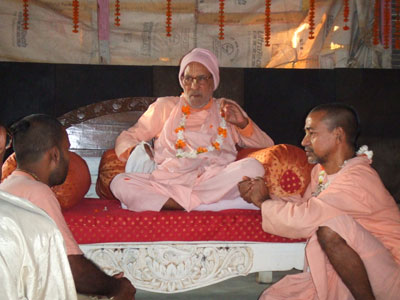
The next morning Srila Maharaja again gave class, this time reiterating many points from the Madhurya Kadambini classes he had given during the month of Kartika. He clearly explained the three points which lead to the conclusion that bhakti manifests in the heart of a devotee only by the mercy of a madhyama-adhikari (an uttama-adhikari in the role of a madhyama-adhikari, or at least a madhyama-uttama [a madhyama-adhikari on the platform of bhava-bhakti]). It is the madhyama-adhikari's nature to act appropriately with God, with the pure devotee, with the neophyte, with the innocent and with the envious. He loves and worships God, he serves and honors pure devotees according to their level of advancement, he shares with those on his level, he shows mercy to the innocent and he avoids those who are against bhakti and devotees. So it is his nature to give mercy bhakti.
The three points: One, bhakti never manifests due to subha-karma, material pious activities, or any other karma. If this was the case it would mean that bhakti is controlled by karma and this is not so. Two, the Supreme Personality of Godhead is also not the bestower of bhakti. If He would bestow bhakti on some and not on others, the fault of partiality would be there. The Supreme Lord is equally disposed to all, and therefore the conclusion is that bhakti will not arise simply by His mercy. Three, an uttama-adhikari sees everyone on the same platform as himself, and he is equal to all. Therefore by the mercy of an uttama-adhikari (an associate of Krsna who is not in the role of a madhyama-adhikari, bhakti is not possible. The conclusion is that one can attain bhakti only by the mercy of a madhyama-adhikari.
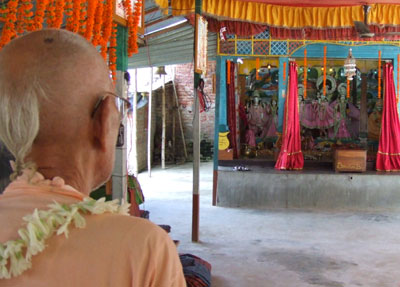
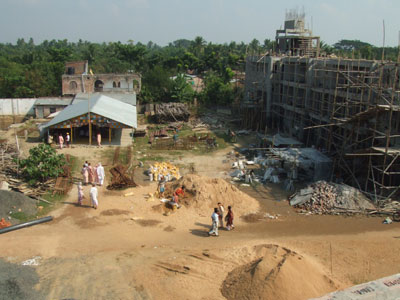
On the morning of November 16th, Srila Maharaja returned to the Srila Vamana Gosvami Gaudiya Matha in Calcutta. There he rested for two days before traveling to Hawaii on November 18th. He will stay in Hawaii for three months, focusing mainly on writing his translation of Srimad-Bhagavatam and Rasa-pancadhyaya.
Photos taken by Radha-kanti dasi
Report written by Sulata dasi and Janaki dasi
Editorial advisors: Sripad Madhava Maharaja and Sripad Brajanatha dasa
Editor: Syamarani dasi
HTML: Bhutabhavana dasa
![[BVML Home Page]](../../grfx/bml_logo.gif)
